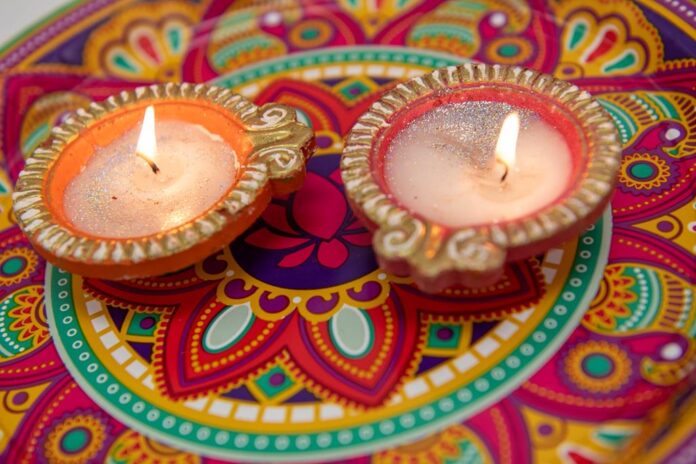Diwali, known as the festival of lights, was celebrated on Oct. 30 at UFV. Created in partnership with UFV International and the Student Union Society (SUS), the event was meant to create a safe and welcoming space for students, fostering cultural diversity and providing an opportunity for international students to connect on campus. Unfortunately, this year’s celebration was unexpectedly cut short. Jayden Hovey, SUS president, Bilal Faisal Faheem, vice-president, and students, shared their insights with The Cascade.
The evening featured an array of cultural foods, including samosas, gulab jamun, jalebi sponsored by RBC, and chai from Chaiiwala. Students were able to partake in diya painting and mehndi, with a student DJ and musical performances by students.
Seven security guards monitored the crowd to ensure a seamless and safe celebration. Additional safety measures included a registration desk and waiver forms for students which outlined code of conduct and behavioural expectations for the events.
The maximum capacity for the event was a total of 400 students, and a growing wait list formed after maximum registration was reached, with 600 students wait-listed. At the time the event started, around 800 students waited in the SUB atrium. Despite the safety measures set in place, wait-listed students were seen shouting and disrespecting SUS staff. Students were attempting to gain access through the back doors of Evered Hall, about 20 people snuck in; some forged wristbands.
Despite this, Faisal felt the festivities inside went well.
“I appreciate those students who attended and respected the organizers, making sure that everybody around them and themselves have a great time at the event.”
SUS clarified that they had no control over disabling the wait list option on Rubric.
“Students that had the wait list ticket thought that having a [ticket] gives them a super high chance of getting inside the event, whereas an actual wait list means that you may or may not get entry to the event, because it is guaranteed to students who have the tickets … we weren’t expecting a wait list of 600 students.”
Hovey believes students should have an understanding of how wait lists work.
“If you’re in the hundreds in terms of the wait list, there should be the onus on the students to understand or have some sort of an expectation that you’re not going to be getting into an event of only 400 people.”
SUS has already approached Rubric to request limits to the wait list capacity. They plan to find alternative means of monitoring registration to avoid having students attempt to circumnavigate the registration process. Clearer communication with students before and during events also needs to be established.
“We want to make sure that there’s a clear expectation for students that if you don’t have a ticket, then you’re to wait outside the line.”
UFV student Sumanpreet Kaur expressed her disappointment over how the event played out.
“The event was scheduled to end at 10 p.m., yet people were still waiting in line for tickets at nine, which created a lot of frustration. The food options were limited, and the quality did not meet expectations. I believe these issues affected the overall enjoyment of the event. To make matters worse, some students crashed the event by entering from another door, which led to the cancellation of the event by SUS. This was bad for those of us who entered by fair means, as we waited in line and got our tickets prior to the event.”
Kirandeep Kaur shared a similar sentiment.
“I was quite excited for [the] Diwali party to celebrate with my friends at university. I even had [a] ticket and ID with me … [there were] big line-ups for entry and within five minutes they shut down everything. I was so shocked, just like everyone else at the party. This was very disheartening for me.”
Hovey reiterated how disappointing it was that students didn’t participate respectfully. He went on to talk more about SUS’ future plans.
“We’re going to continue putting on great events and we want to make sure that students feel welcome and they feel safe at events. The students are the community and we want to be the ones who can help put the work into planning these sorts of gatherings where students can get together and have a great time.”
While not what they planned, the outcome of the event has inspired SUS to work even harder to ensure the safety and experience of students. Diwali was a learning experience for SUS, and they want to ensure that cultural and community engagement on campus continues to grow.



